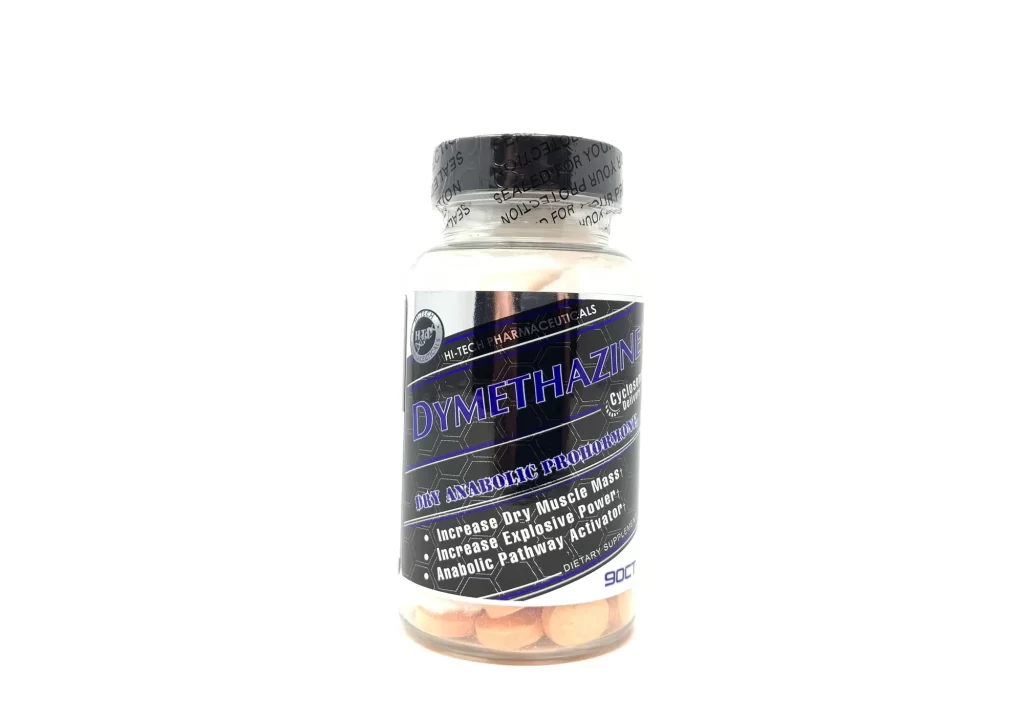What is DMZ Dymethazine and How Does it Work?

You may have heard about DMZ Dymethazine if you’re seeking for a potent prohormone to aid in the rapid development of muscular growth and strength. A lot of sportsmen and bodybuilders use this anabolic steroid since it gives them great results without making them puffy. How does DMZ Dymethazine work, and what is it? In this essay, we will discuss the advantages, disadvantages, dose, and cycle of this powerful prohormone.
What is DMZ Dymethazine?

DMZ Dymethazine is a prohormone that metabolises into methasterone and desoxymethyltestosterone, two powerful anabolic steroids. It is also known as dimethazine, mebolazine, or DMZ. Both Superdrol and Pheraplex are anabolic steroids that have been prohibited by the FDA and the World Anti-Doping Agency (WADA) owing to their potential for abuse and the positive benefits they have on athletic performance.
Although DMZ Dymethazine was created in the 1990s, it was never authorised for use in humans as a therapy for cancer or HIV/AIDS. In 2009, iForce Nutrition began selling it as a dietary supplement under the brand name Dymethazine. There have been several more DMZ Dymethazine releases since then, including products from Competitive Edge Labs (with their D-Zine), Blackstone Labs (with their Brutal 4ce), and IronMag Labs (with their Super DMZ).
The molecular structure of DMZ Dymethazine is unique, since it is made up of two Superdrol molecules joined by an azine bridge. This makes it more stable than pure Superdrol and less harmful to the liver. It does, however, make it more difficult for the body to digest and absorb. As a result, a greater quantity of DMZ Dymethazine must be taken than that of Superdrol in order to obtain the same results.
DMZ Dymethazine is typically taken between 15 mg to 45 mg day, however this may vary greatly from user to user according on their experience and objectives. Post-cycle treatment (PCT) is used to restore the natural hormone balance and avoid adverse effects, and a typical cycle lasts between four and six weeks.
How Does DMZ Dymethazine Work?
DMZ Dymethazine’s effects come from the hormones it converts into in the liver, methasterone and desoxymethyltestosterone. When these hormones reach muscle cells, they attach to androgen receptors, which triggers gene transcription. This causes a rise in protein synthesis and nitrogen retention, both of which are crucial for the development and maintenance of muscle mass.
Muscle-building effects predominate over masculinizing ones with DMZ Dymethazine because to its high A/A ratio. Those who desire to bulk up without experiencing side effects like hair growth, acne, or a swollen prostate will benefit greatly from this.
In addition, DMZ Dymethazine does not aromatize into oestrogen or produce gynecomastia (male breast growth) because to its poor affinity for oestrogen receptors. Side effects include poor libido, mood swings, exhaustion, and testicular atrophy are possible since it interferes with the body’s normal synthesis of testosterone and other hormones.
What are the Benefits of DMZ Dymethazine?

Users who are interested in improving their physical performance and looks may get various advantages by using DMZ Dymethazine. Some examples of these advantages are:
- Rapid and dramatic muscle gains: Users of DMZ Dymethazine1 may anticipate to grow as much as 16 pounds of muscle in only one cycle. This is because it improves skeletal muscle protein synthesis and nitrogen retention.
- Increased strength and power: Users that use DMZ Dymethazine2 often report feeling much stronger and more powerful than before. They may be able to improve their strength and athleticism as a result.
- Hardened physique: DMZ Dymethazine users often report seeing gains in muscle definition and vein prominence. DMZ Dymethazine’s ability to decrease fluid retention and promote muscular density explains why.
What are the Risks of DMZ Dymethazine?
While DMZ Dymethazine has certain positive effects, it also has some negative ones. When utilised incorrectly or in excess, this methylated prohormone may have devastating effects on the liver and other organs. Use of DMZ Dymethazine may have the following risks:
- Liver toxicity: The most prevalent and potentially fatal side effect of taking DMZ Dymethazine is liver damage. This is due to the fact that DMZ Dymethazine is metabolised many times in the liver before being flushed out of the system. Inflammation, jaundice, hepatitis, cirrhosis, and ultimately liver failure may result from this excessive strain on liver cells. You may reduce your exposure by taking a liver support supplement or a complete cycle support supplement while using DMZ Dymethazine and keeping your period short.
- High blood pressure: Another typical side effect of DMZ Dymethazine is an increase in blood pressure. Because of its effects on water retention and red blood cell formation, DMZ Dymethazine may raise blood volume and viscosity in the body. This may increase the burden on the cardiovascular system, which can lead to cardiovascular disease, stroke, and even renal failure. Users may reduce their exposure by keeping a close eye on their blood pressure and avoiding additional stimulants or salt while taking DMZ Dymethazine.
- High cholesterol: Another significant side effect of DMZ Dymethazine is an increase in cholesterol levels. That’s because DMZ Dymethazine has been shown to increase levels of “bad” LDL cholesterol in the blood while decreasing levels of “good” HDL cholesterol. Atherosclerosis and coronary artery disease are among the cardiovascular conditions that might result from this. A balanced diet high in fibre, omega-3 fatty acids, antioxidants, and phytosterols should be maintained by DMZ Dymethazine users to reduce the likelihood of this side effect.
- Gynecomastia: The development of gynecomastia is another side effect of DMZ Dymethazine that is fairly uncommon. The disorder manifests itself in males with increased breast tissue caused by an oestrogen and testosterone imbalance. Despite the fact that DMZ Dymethazine does not aromatize into oestrogen, it might nonetheless inhibit the body’s normal testosterone synthesis. Some individuals may develop an oestrogen dominance if they have a hereditary predisposition towards it. Aromatase inhibitors (AIs) and selective oestrogen receptor modulators (SERMs) are two types of anti-estrogen supplements that users may take throughout their cycle to avoid this danger.
- Acne: Use of DMZ Dymethazine is also associated with an increased incidence of acne. This is because DMZ Dymethazine has been shown to elevate levels of dihydrotestosterone (DHT), a hormone responsible for the production of sebum (oil) by the skin’s glands. This may lead to skin irritation, infection, or scarring by blocking the pores. Those using DMZ Dymethazine should take extra care to keep their skin clean and moisturised by using a gentle cleanser and moisturiser.
- Hair loss: Loss of hair is another major side effect of DMZ Dymethazine. This is because DMZ Dymethazine increases 5-alpha reductase enzyme activity in the body, which in turn increases the conversion of testosterone into DHT in the scalp follicles. Because of this, hair follicles may weaken and fall out. Users using DMZ Dymethazine should also utilise a topical anti-DHT medication such minoxidil or finasteride to avoid this side effect.
- Aggression: Aggression is another side effect that may occur with taking DMZ Dymethazine. Because of its effects on catecholamine production and release in the body, DMZ Dymethazine raises dopamine and norepinephrine levels in the brain. The user’s mood, motivation, and concentration may improve, but they may also become more easily angered and aggressive. Users of DMZ Dymethazine might reduce their risk of adverse effects by avoiding stressful circumstances and learning to relax.
- Suppression of natural testosterone production: Reduced synthesis of endogenous testosterone: The inhibition of natural testosterone production is the most significant danger of taking DMZ Dymethazine. Dymethazine DM may send signals to the brain and pituitary gland, telling them to cease making testosterone-stimulating luteinizing hormone (LH) and follicle-stimulating hormone (FSH). Low testosterone levels have been linked to a host of health problems, including loss of libido, erectile dysfunction, infertility, melancholy, weight gain, sluggishness, and osteoporosis. Taking a testosterone-boosting supplement throughout a cycle, such tribulus terrestris or D-aspartic acid, may help users avoid this danger. As an added precaution, consumers should engage in post-cycle treatment (PCT) once their cycle is over.
- Legal status: The legality of utilising DMZ Dymethazine is the last potential downside. on the United States, the Drug Enforcement Administration (DEA) places DMZ Dymethazine on Schedule III of the restricted substances list. Without a valid prescription from a medical professional, it is unlawful to possess, use, purchase, sell, or distribute. Users who break this legislation risk serious consequences, including fines, jail time, or both. Furthermore, the World Anti-Doping Agency (WADA) and the International Olympic Committee (IOC) have also issued bans on DMZ Dymethazine. A positive DMZ Dymethazine test may result in disciplinary action, including expulsion from competition.
Conclusion
Gaining muscle and strength rapidly is possible with the aid of DMZ Dymethazine, a potent prohormone. There are, however, significant hazards and adverse effects that should not be disregarded. Users of DMZ Dymethazine are encouraged to do so responsibly and with prudence. Before utilising, they should talk to a doctor about the best dose, duration, cycle support, and post-cycle treatment plan for them. They should also be aware of the legal ramifications of using it so that they don’t get in problems with the law or with the authorities in charge of sports in their country.

 What to Know About Adult Adoption
What to Know About Adult Adoption  Top 10 Fascinating Facts About Wild Cats
Top 10 Fascinating Facts About Wild Cats  The Best Compression Socks of 2024
The Best Compression Socks of 2024  The Ultimate Gaming Chairs in 2024
The Ultimate Gaming Chairs in 2024  Exploring the World of Old Fashioned Ice Cream Maker
Exploring the World of Old Fashioned Ice Cream Maker  Relax and Game with the Gengar Bean Bag Chair
Relax and Game with the Gengar Bean Bag Chair  The Art and Importance of Designing Safe and Effective Horse Jump Standards
The Art and Importance of Designing Safe and Effective Horse Jump Standards  The Art of Compromise: Resolving Family Disputes Amicably
The Art of Compromise: Resolving Family Disputes Amicably  The Benefits and Challenges of Sustainable Roofing for Commercial Buildings
The Benefits and Challenges of Sustainable Roofing for Commercial Buildings  Transforming Your Home with Terrazzo Flooring: A Timeless Choice for Elegance and Durability
Transforming Your Home with Terrazzo Flooring: A Timeless Choice for Elegance and Durability